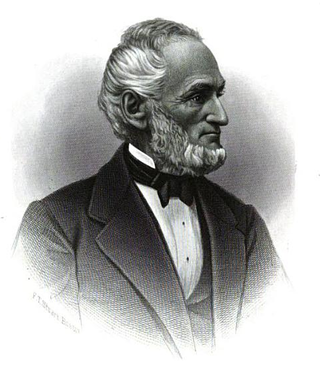
Amasa Walker was an American economist and United States Representative. He was the father of Francis Amasa Walker.

The Boston mayoral election of 1854 saw the reelection of incumbent mayor Jerome V. C. Smith. It was held on December 11, 1854.

The Boston mayoral election of 1855 saw the election of Alexander H. Rice. It was held on December 10, 1855.

The Boston mayoral election of 1856 saw the reelection of Alexander H. Rice. It was held on December 8, 1856.

The Boston mayoral election of 1857 saw the election of Frederic W. Lincoln Jr. It was held on December 14, 1857.

The Boston mayoral election of 1858 saw the reelection of Frederic W. Lincoln Jr. It was held on December 13, 1858.

The Boston mayoral election of 1860 saw the election of Joseph Wightman. The was the first Boston mayoral election won by a Democratic Party nominee. It was held on December 10, 1860.

The Boston mayoral election of 1861 took place on Monday, December 9, 1861, and saw the reelection of Joseph Wightman.

The Boston mayoral election of 1869 saw the reelection of Nathaniel B. Shurtleff to a third consecutive term.

The Boston mayoral election of 1853–1854 saw the election of Citizens Union Party nominee Jerome V. C. Smith. The election took three votes, as no candidate secured the needed majority in the first two attempts. Incumbent Whig mayor Benjamin Seaver had run for reelection as his party’s nominee in the first vote, but opted not to compete in the second or third votes.

The Boston mayoral election of 1852 saw the reelection of Benjamin Seaver to a second term. It was held on December 13, 1852.

The 1850 Boston mayoral election saw the reelection of incumbent Whig mayor John P. Bigelow to a third consecutive term. It was held on December 9, 1850.

The 1848 Boston mayoral election saw the election of Whig Party nominee John P. Bigelow. It was held on December 11, 1848. Incumbent Whig mayor Josiah Quincy Jr. was not a nominee for reelection.

The 1846 Boston mayoral election saw the reelection of Whig Party incumbent Josiah Quincy Jr. It was held on December 14, 1846.

The 1844–45 Boston mayoral election saw the election of Native American Party nominee Thomas Aspinwall Davis as mayor of Boston. The election took eight votes, as no candidate secured the needed majority in the first seven attempts. Incumbent Whig Party mayor Martin Brimmer was not a nominee reelection.

The 1836 Boston mayoral election saw the election of Whig Party nominee Samuel Atkins Eliot. It was held on December 12, 1836. Incumbent Samuel T. Armstrong was not a nominee for reelection.

The 1835 Boston mayoral election saw the election of Whig Party nominee Samuel Turell Armstrong. It was held on December 14, 1835.

The 1832 Boston mayoral election saw the reelection of incumbent Charles Wells. It was held on December 10, 1832.

The 1831 Boston mayoral election saw the election of Charles Wells. The first vote, held on December 12, 1831, did not result in any candidate receiving the required majority of the vote, resulting in a second vote on December 22, 1831, which Wells won.

The 1830 Boston mayoral election saw the reelection of incumbent Harrison Gray Otis to a third consecutive term. It was held on December 13, 1830.





